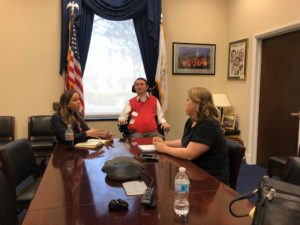Written by Mackenzie Saunders:
Living with a spinal cord injury or any disability means facing different barriers and obstacles on a regular basis. However, barriers can oftentimes be removed through advocacy and political action. Barriers such as accessibility issues in communities and the lack of Medicare funding for critical wheelchair technology can be remedied by federal or state lawmakers. These lawmakers can sponsor a piece of legislation, address the issue on the floor, and request Departmental changes in order to address the issue at hand.
Typically, lawmakers do not take political action against specific barriers or obstacles unless their constituents call attention to the issues they are facing and present solutions to these issues. Calling attention to an issue and supporting a particular solution is often referred to as advocacy. This means that, in order to create political action, people in the disability community should talk to their lawmakers about the obstacles they face and advocate for the changes they would like to see put in place.
Talking to a lawmaker can seem daunting. Below are some tips for conducting successful political advocacy with lawmakers.
Three Keys to Successful Political Advocacy
There are three main steps to success in political advocacy: build a long-term relationship, stay informed and prepared, and be yourself.

Building a long-term relationship with your Senator, Representative, state politicians, and their staffers is key to successfully advocating for the changes you want to see. To build a long-term relationship, you must establish common ground with you and the person you are meeting with. Maybe your lawmaker or their staffer has a family member with a disability, or maybe they have a personal story involving injury. Find similarities while talking to your lawmaker in order to make a lasting impression and catch their attention on the issue at hand. Building a long-term relationship with your lawmakers or their staffers means that you must think and act long term. You most likely will not make as much headway as you like during your first meeting with your lawmaker; meet with them for the first time with the intention of meeting again in the future. Acting and thinking long term involves always following up with your lawmaker after the meeting. A follow-up email or phone call shows that you are committed to the issue at hand, and following up demonstrates your desire for a long-term, working relationship.
Staying informed and prepared is key in political advocacy. Before meeting with your lawmaker, make sure you research the legislation that pertains to the issue you will be talking about. Research the legislation that is already in place, along with the legislation that may be in the process of passage in Congress. Take notes on the research you conduct, and use these notes during the meeting with your lawmaker to ensure that you discuss all necessary points. Staying informed and prepared also means coming to the meeting with a proposed solution to the problem you are facing. This solution can be advocating for amendments to existing legislation, advocating for new legislation, or encouraging the creation of a task force or government committee to research the issue at hand. Coming to the meeting informed and prepared shows your lawmaker that you care about the issue you are discussing. Showing your lawmaker that you are knowledgeable and passionate about the topic of discussion increases your credibility and maximizes your chances of creating political action.
The last key to successful political advocacy is simple: be yourself. Do not be afraid to be yourself; lawmakers and their staffers respond well to honesty, transparency, and authenticity. Tell your lawmaker the story of your injury or disability and relate your story to the issue at hand. Telling your story is a great way to convey how the topic of discussion truly affects you on a day-to-day basis. Stories create empathy, and empathy often spurs action.
Remember that your lawmaker was elected to represent their constituents—being yourself and telling your story gives your lawmaker insight as to who they were elected to represent and what issues they need to address in order to benefit their constituency.
The Importance of Federal and State Political Advocacy
Getting involved in political advocacy is key to creating positive change within the disability community. Involvement in both federal and state political advocacy is important. Federal political advocacy focuses on nationwide change where constituents can call attention to issues of importance. Meeting with federal lawmakers and their staffers is most beneficial when you are trying to advocate for support of legislation that is in the process of passage. Often, federal lawmakers are less available for meetings than state lawmakers, and federal legislation is typically slower to change. State political advocacy, on the other hand, focuses more on creating quick solutions in your state. State political advocacy is most beneficial when the barriers you are facing are specific to the state in which you live. Typically, state lawmakers are more available to meet one-on-one. Whether you are meeting with federal and state lawmakers, political advocacy is vital to creating change.
Getting involved in political advocacy can be daunting, but there are three main steps to take in order to successfully create political change. Remember to build a long-term relationship with your lawmakers and their staffers, stay informed and prepared for the meeting, and be yourself. Political advocacy is key to creating necessary change within the disability community. You have the power to create change; all you have to do is get involved.

